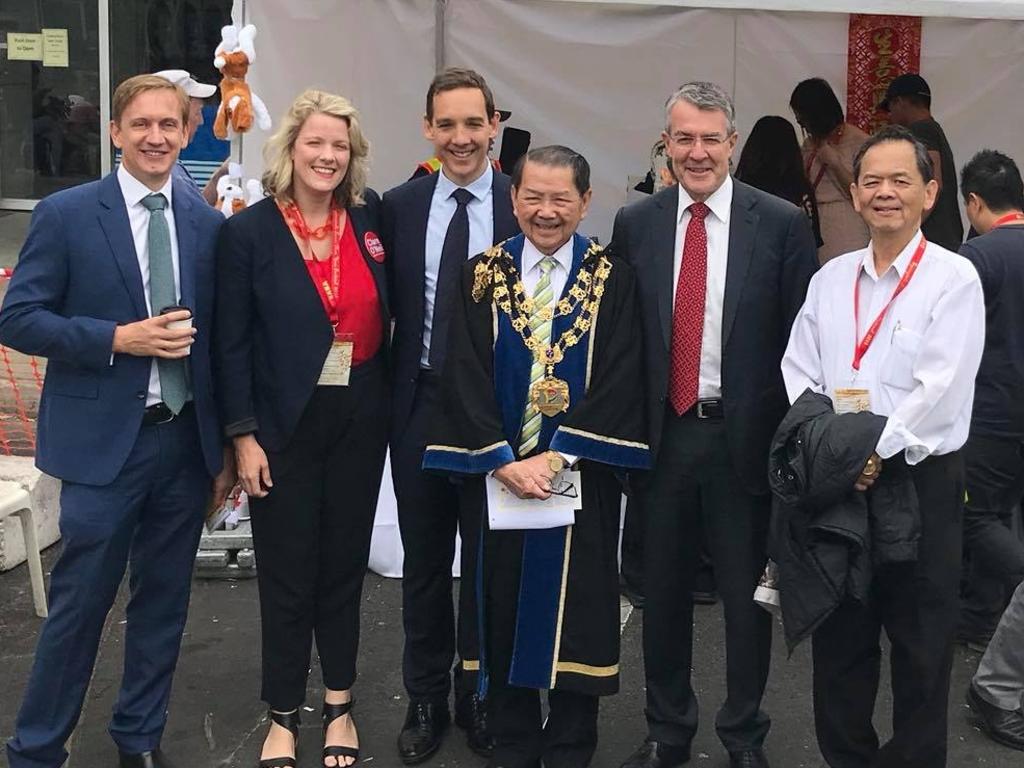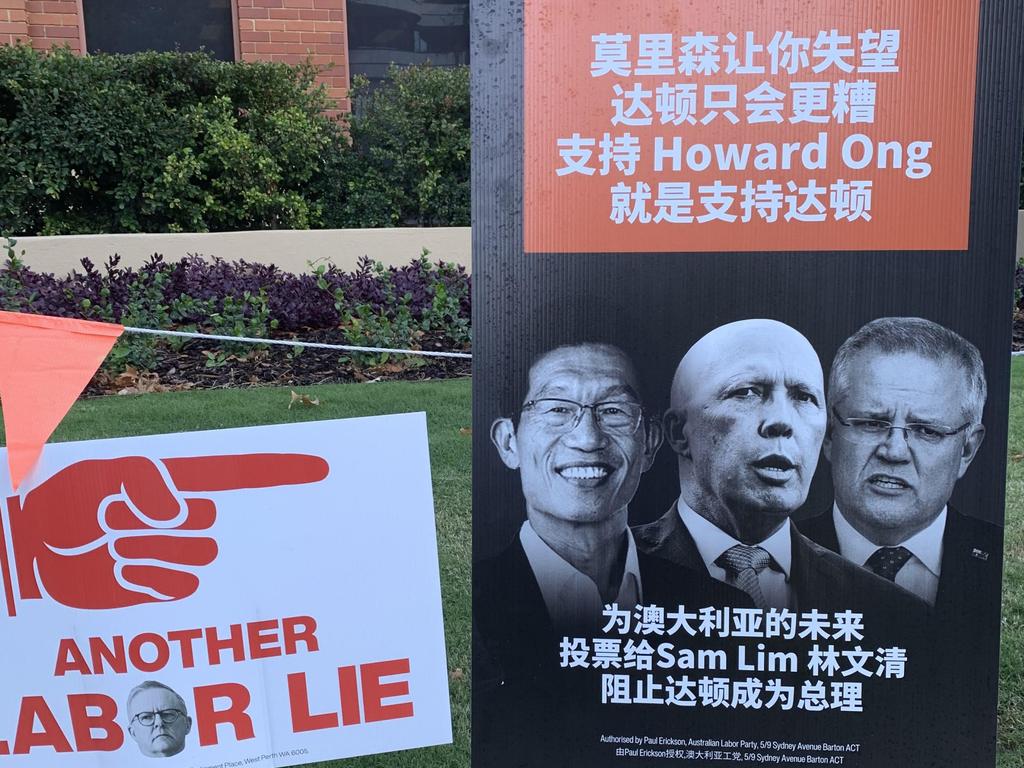Election 2025: Anthony Albanese and Penny Wong dine out with friends of Chinese Communist Party
Labor has courted Beijing-backed property developers and senior figures in the Chinese Communist Party’s foreign influence arm in a pre-election push for donations and votes in key seats.

Labor has courted Beijing-backed property developers and senior figures in the Chinese Communist Party’s foreign-influence arm in a pre-election push to secure Australian Chinese donations and lock in the community’s votes in key seats.
The Australian can reveal Anthony Albanese celebrated his birthday in March at an intimate lunch with the Chinese Building Association of NSW, which has close ties to state-run construction firms in China.
And Foreign Minister Penny Wong enjoyed yum cha in Brisbane last month with ALP donor Peter Zhiwu Zheng, the president of a Chinese cultural association linked to the CCP’s United Front Work Department.

The revelations come after The Australian revealed cabinet minister Clare O’Neil’s campaign recruited 10 members of a Chinese United Front-linked group to staff polling booths in her seat of Hotham on polling day.
Australian Chinese votes will be critical in at least 10 seats in Saturday’s election, including four each in Sydney and Melbourne, and one each in Brisbane and Perth.
The Prime Minister, who was lauded last year by Chinese state-run media as an example for other world leaders to follow, is banking on solid support from the community to get Labor across the line.
The Coalition has also worked hard to win over the ethnic group by cultivating ties with Chinese organisations, and has preselected a candidate with strong ties to Beijing for the unwinnable sixth spot on the LNP’s Queensland ticket.
Members of the CBANSW sang happy birthday to Mr Albanese and presented him with a sparkler-topped cake at the function in early March, just weeks before the Prime Minister called the May 3 poll. Video of the event was circulated on WeChat by a Beijing-based influencer who shares Australian content with more than 3 million followers.

The CBANSW’s China-born chief executive, Carson Gao, who is seated to Mr Albanese’s right in the video, was in China this week spruiking investment opportunities in Australia’s resurgent property sector. Mr Gao led the association’s delegation during meetings with the China Real Estate Association, major developers and supply chain firms.
The association’s president and founder Hao Liu is managing director of the Chinese-owned construction company Starryland Australia, whose parent company is the state-owned Hubei Fuxing Science and Technology Co. Another of the association’s board members, property developer Harvard Shen, is on the committee of the United Front body Australian Chushang Entrepreneurs Association.

Senator Wong and Labor’s candidate for the Brisbane seat of Moreton, Julie-Ann Campbell, dined with Mr Zheng at the Landmark Restaurant, in suburban Sunnybank, on April 7.
Moreton is home to the largest concentration of people with Chinese ancestry in Brisbane, according to census data, and is one of the many outer-suburban seats Peter Dutton has targeted.
Mr Zheng, who has donated $13,000 to Queensland Labor and $1090 to the LNP since 2019, according to AEC records, is president of the Australia China Cultural and Economic Promotion Association – a key United Front group in Queensland.
According to the Australian Strategic Policy Institute: “The overseas functions of United Front include increasing the CCP’s political interference, interfering in Chinese (expat communities), suppressing dissident movements, building a permissive international environment for a takeover of Taiwan, intelligence gathering, encouraging investment in China, and facilitating technology transfer.”
The CBANSW lunch for Mr Albanese followed a prime ministerial invitation to Mr Gao last year to attend a lunch in Parliament House’s Great Hall with Chinese Premier Li Qiang.
Mr Gao also hosted Skills and Training Minister Andrew Giles and Labor’s member for Bennelong, Jerome Laxale, in January to discuss the sector’s challenges and opportunities, and invited opposition housing spokesman Michael Sukkar to address its 2024 gala dinner. Bennelong and Mr Sukkar’s Deakin also have large Chinese communities.
Clive Hamilton, who exposed the Chinese Communist Party’s global program of influence and subversion in his book Hidden Hand, said the CBANSW almost certainly took its cues from the CCP. “It’s fair to assume that any Chinese business association is one that Beijing will have an interest in – it’s just how they work,” Professor Hamilton said.
Labor campaign headquarters declined to comment on Mr Albanese’s dealings with the association and Senator Wong’s meeting with Mr Zheng. Mr Gao also passed up the opportunity to comment, saying he was feeling ill after returning from his China trip.

Labor took the heat out of the Australia-China relationship after it deteriorated under the Morrison government, with Beijing slapping trade bans on $20bn worth of Australian exports. Mr Albanese worked hard to stabilise bilateral ties, meeting Chinese President Xi Jinping at the G20 in Bali six months after he was elected, and travelling to China for an official visit 12 months later. The Prime Minister has been at pains to avoid offending Beijing, declining to nominate China in last Sunday’s leaders debate as the nation’s biggest security threat despite the recent circumnavigation of the continent by three Chinese warships, and a bipartisan pledge to strip Chinese company Landbridge of its lease over the Port of Darwin. “I am the Prime Minister of a country and how you deal as Prime Minister is diplomatically,” he said.
The Opposition Leader , who has softened his hawkish rhetoric on China in recent times, was less restrained. “The biggest concern from our intelligence agencies and defence agency is in relation to the Communist Party of China, and they’re worried about conflict in our region,” Mr Dutton said.
“They’re worried about what that would do to … our trade, what it would do for our security settings, what we would need to do to respond to say a cyber attack on our country.”
The election watchdog has revealed it will refer allegations that the Hubei Association planned to send dozens of volunteers to support Ms O’Neil and Greens candidates to a national taskforce for investigation. The taskforce, which includes ASIO and Australian Federal Police officials, is investigating the association’s involvement in teal MP Monique Ryan’s campaign in Kooyong.
The LNP has also faced scrutiny over its preselection of ethnic Chinese property developer Peter Zhuang on its Queensland Senate ticket. Mr Zhuang maintains extensive business interests in China and his biography says he is the treasurer of the Australia-China Friendship Society of Queensland.

In Melbourne, the Chinese community is concentrated in three marginal seats in the city’s eastern suburbs – Labor’s Chisholm and the Liberals’ Menzies and Deakin, all of which will be crucial to the election outcome – as well as Greens’ leader Adam Bandt’s seat of Melbourne.
Kooyong is a fifth Melbourne seat where the Chinese vote will play a part but the Victorian redistribution has moved a sizeable proportion of the community across the border into Menzies.
The marginal Labor-held seat of Reid in Sydney’s inner west is at the heart of the city’s large Chinese community, with more than 50 per cent of people in Burwood having Chinese ancestry.
Labor’s Sally Sitou, who has Chinese Laotian parents, won Reid in 2022, and holds the seat with a margin of 5.2 per cent after the NSW electoral redistribution.
Other Sydney battleground seats where the Chinese vote will be crucial include: Bradfield, where teal candidate Nicolette Boele is hoping to topple the Liberals at the second attempt; Bennelong, which Labor MP Jerome Laxale hopes to retain after seeing the boundary changes render the seat notionally Liberal by just 0.04 per cent; and Labor MP Andrew Charlton’s Parramatta, which has had a sizeable increase in its Chinese community after large parts of Epping and Eastwood were shifted out of Bennelong.

Outside the nation’s two largest cities, the other seats with large Chinese communities are Moreton in Brisbane’s south, which Labor holds with a margin of 9.1 per cent, and the marginal southern Perth seat of Tangney, held by Labor’s Sam Lim (2.8 per cent), who won it in 2022.







To join the conversation, please log in. Don't have an account? Register
Join the conversation, you are commenting as Logout